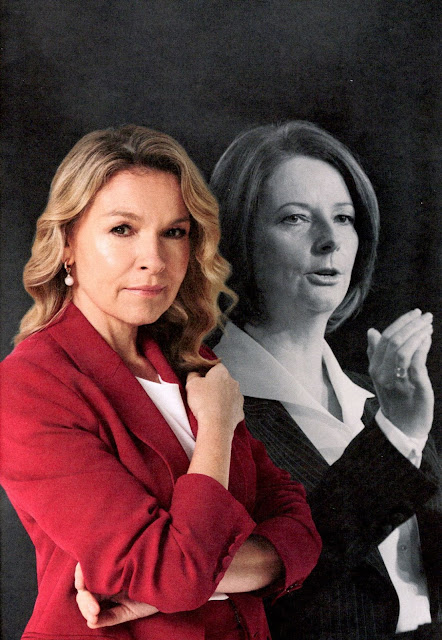 |
| Justine Clarke / Julia Gillard |
Reviewed by Frank McKone
Opening Night March 21
Director – Sarah Goodes; Designer – Renée Mulder
Lighting Designer – Alexander Berlage
Composer and Sound Designer – Steve Francis
Video Designer – Susie Henderson
Asst Director – Charley Sanders; Voice Coach – Jennifer White
Performed by Jessica Bentley representing ‘Young Woman’ in her developing understanding of Justine Clarke’s ‘Julia’ – one-time Prime Minister Julia Gillard, the first and as yet only woman prime minister of Australia.
_______________________________________________________________________________
Joanna Murray-Smith’s Julia, ending as it must with Julia Gillard’s ‘Misogyny’ speech, is an extraordinary work of theatre art – perhaps the most important Australian play in our history, past, present and future.
The writing is compact, every word is significant, placed perfectly to reveal Julia’s character, motivation, intellect and power in the context of real life and death. The text is a gift for an actor of Justine Clarke’s sensitivity and for director Sarah Goodes’ intuition in making meaning of every moment in voice, movement and facial expression. This production takes us to the core of drama, to the performance of the truth, to the story-telling which is the essence of human nature.
Julia is a play about leadership. You may not expect it, but Julia is as central to the modern political leadership question – the place of women at the top – as another great play from the past – Shakespeare’s Richard III (1592-3). This was about leadership by a king, ironically written at the very time that William’s ruler was the extraordinary woman, Queen Elizabeth I. And so I could not help remembering Kate Mulvany’s terrific performance of Richard (reviewed here 13 April 2017). Justine Clarke is a perfect match.
Of course the parallel is not perfect. 500 years of archaeology – see The Lost King also reviewed here, 7 December 2022 – has shown that Shakespeare’s story was not all factual. Julia quotes Hansard when she demolishes Opposition Leader Tony Abbott, but Thomas Hansard took over William Cobbett’s 1803 parliamentary reporting business in only 1810. Julia notes the point, and I add that there was no written record of Richard III killing the two boys in the Tower of London.
The parallel, though, is very close when it comes to the anguish and self-analysis while finding the way to becoming the leader, whether King or Prime Minister, and managing the task when in the role. As Julia represents it, Question Time is not far short of throwing the opposition into dungeons, while the Party Room surely often came down to words like these:
Buckingham: Your grace may do your pleasure.
K. Richard: Tut, tut! Thou art all ice, thy kindness freezeth.
Was Julia Gillard Kevin Rudd’s ‘Buckingham’ in 2010, with the roles reversed in 2013?
https://www.google.com/search?client=firefox-b-d&q=rudd+gillard+rudd+timeline
The reason I emphasise the importance of this play is that gaining full equality in decision-making powers of women, men, and all the other varieties of humankind (determined by our genes or our cultural differences) is crucial to our future – in our daily lives and as a species.
We face a world still run by those who think they are kings. And a world where our kindness freezes even as we cause the ice to melt.
Listen to Julia. Hear, see and understand Justine's performance. Notice Sarah's concept of the drama. Respond to Joanna’s work of art. Let the wonderful depth of feeling in Renée’s set design call you to do as Julia Gillard said:
….I say to the Leader of the Opposition I will not be lectured about sexism and misogyny by this man. I will not. And the Government will not be lectured about sexism and misogyny by this man. Not now, not ever….Because if he wants to know what misogyny looks like in modern Australia, he doesn't need a motion in the House of Representatives, he needs a mirror. That's what he needs.
Julia is the mirror we all need. Don’t miss it.
______________________________________________________________________________
Copies of Frank McKone's reviews are also available at